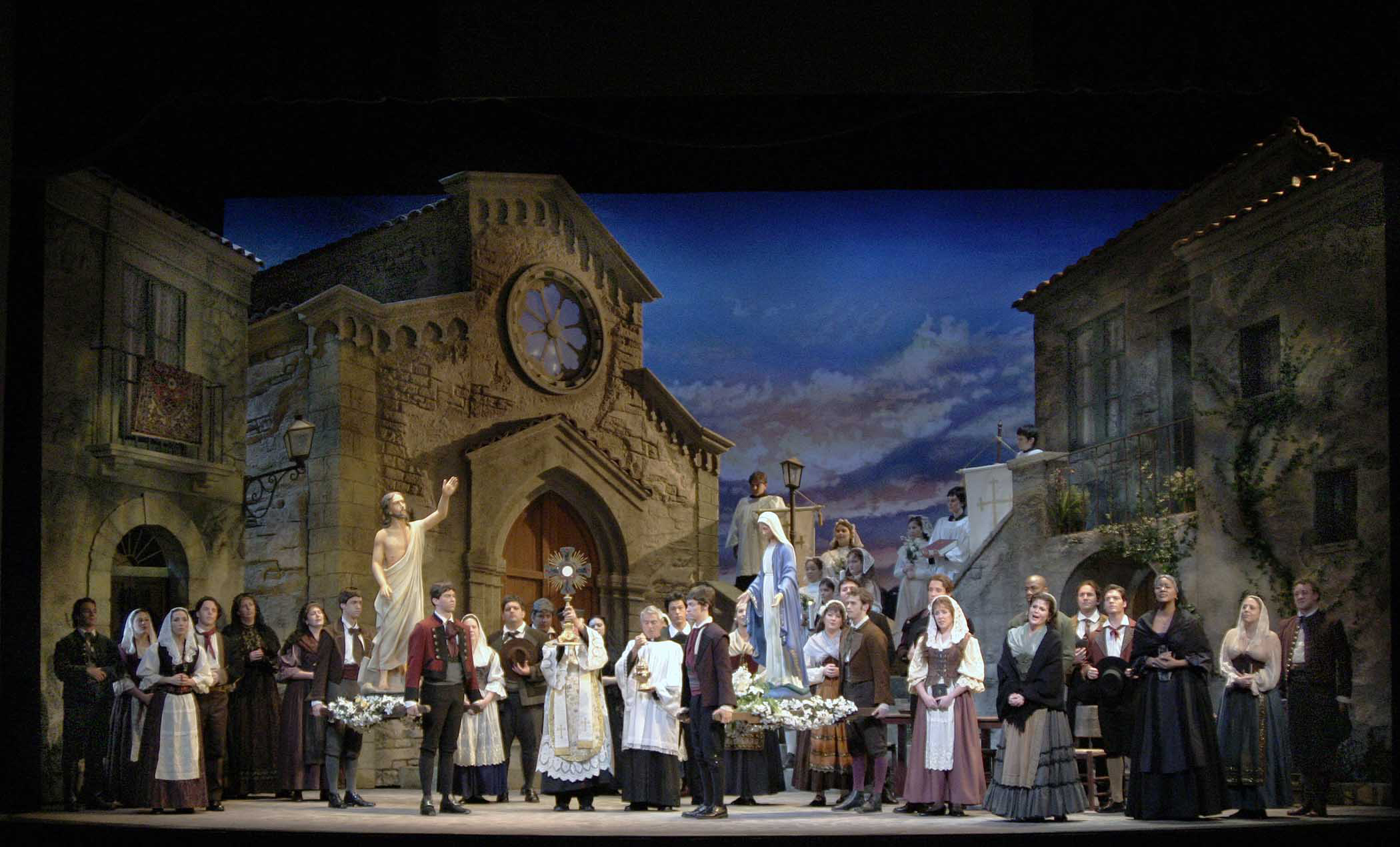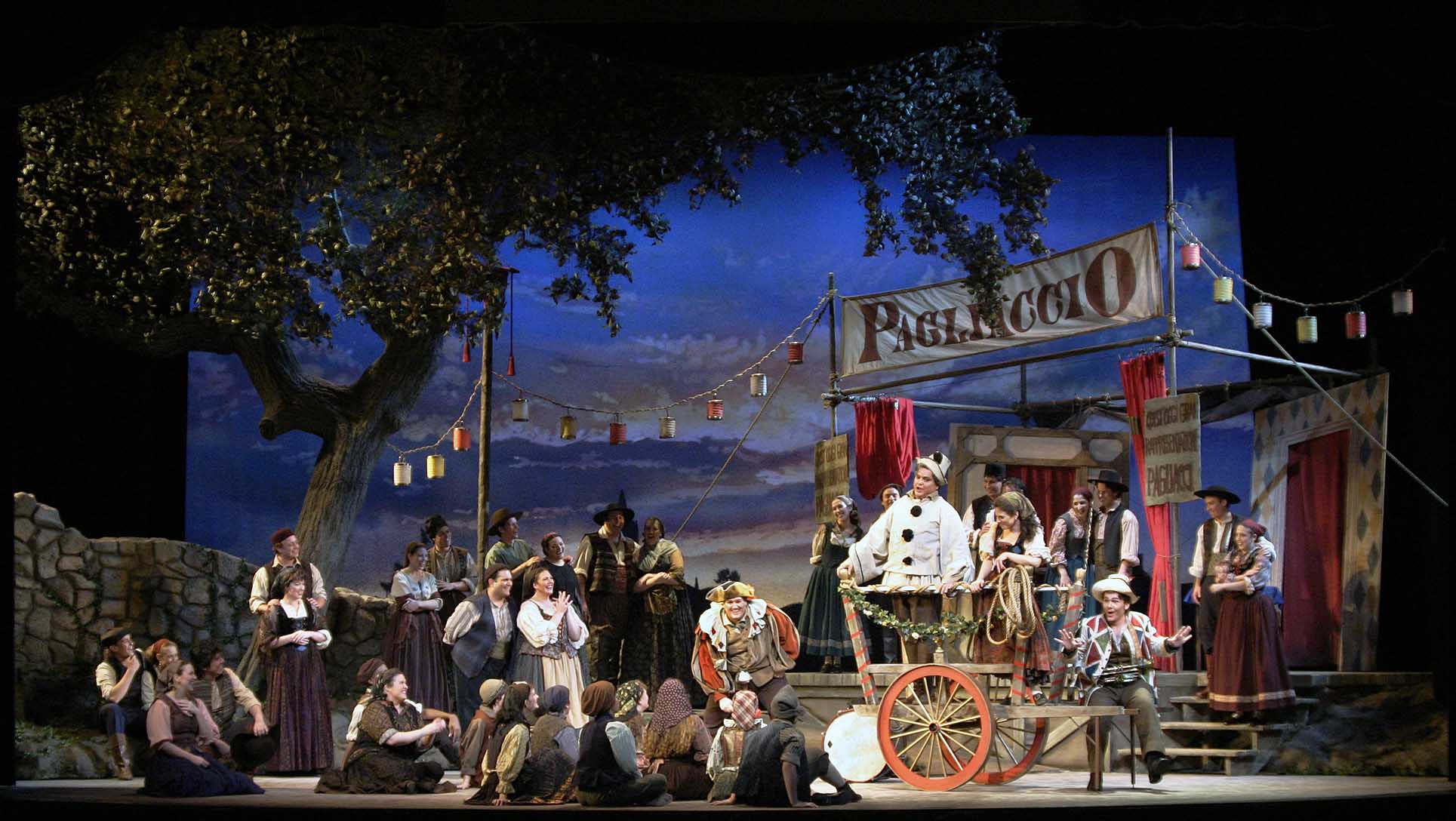Cavalleria rusticana - synopsis
Opera in one act
Music by Pietro Mascagni
Libretto by Guido Menasci and Giovanni Targioni-Tozzetti
Based on a short story and play by Giovanni Verga

Sarasota Opera's 2005 production of Cavalleria rusticana. Set design by David P. Gordon. Photo by Debra Hesser.
The action takes place in a Sicilian village on Easter morning.
The town stirs as the men return from the fields and the women prepare for Easter. Santuzza, who has been abandoned by her lover Turiddu, asks his mother, Lucia, where she can find him. Alfio, a carriage driver, arrives. He boasts about his faithful wife Lola and the joys of his work.
A religious procession enters the town square and the villagers follow it into the church for mass. Left alone, Santuzza tells Lucia that Turiddu has abandoned her and is now seeing Lola, his former lover and Alfio’s wife. After Lucia has gone to mass, Turiddu arrives and Santuzza confronts him. He denies being unfaithful, but she continues to accuse him. Lola then passes on her way to church and Turiddu eventually follows her. Enraged by his betrayal, Santuzza tells Alfio of Lola’s infidelity. Alfio swears he will exact vengeance.
After mass, Turiddu invites the villagers for a drink. When Alfio enters, Turiddu offers him a glass of wine. Alfio refuses, saying it might poison him. Understanding his meaning, Turiddu challenges him to a duel.
In a farewell to his mother, Turiddu asks her to take care of Santuzza. As he goes off, Lucia calls after him. Noise is heard in the distance and a woman cries out that Turiddu has been killed.
Pagliacci - synopsis
Opera in a prologue and two acts
Music and Libretto by Ruggero Leoncavallo

Sarasota Opera 2005 Production - Set design by David P. Gordon, photo by Debra Hesser
The scene takes place in Calabria near Montalto, on the Feast of the Assumption, between 1865 and 1870.
In the prologue, the character Tonio speaks directly to the audience, telling them that the author has written a true story about real people who share the same joys and sorrows they do.
ACT I
The villagers celebrate the feast day as a theatrical company arrives on the outskirts of town. Canio, head of the troupe, announces that a performance will take place that evening. When Tonio, another member of the troupe, attempts to help Nedda, Canio’s wife down from the cart, the villagers tease Canio that Tonio is courting her behind his back. Sternly, Canio warns that he will not tolerate joking about his relationship with Nedda. Canio joins a group of villagers as they go off to drink. At the sound of a bagpipe and church bells, the remaining villagers go off to church, leaving Nedda alone.
Disturbed by her husband’s reaction, Nedda notices the birds overhead and sings about how she desires their freedom. Having overheard her song, Tonio declares his love for Nedda but she rebuffs him. Enraged, he tries to grab her, but she strikes him with a whip. As he leaves, Tonio swears vengeance.
A moment later the peasant Silvio appears and tells Nedda how much he loves her. He persuades her to run away with him at midnight. Tonio, who has seen them, hurries off to tell Canio. Canio discovers the lovers and attempts to overtake Silvio who manages to escape. When confronted, Nedda refuses to divulge her lover’s name. Tonio advises Canio it would be better to wait until that evening to learn who Nedda’s lover is. Left alone, Canio laments that he must go on with the performance despite his pain.
ACT II
The villagers assemble for the performance. In the absence of her husband, Pagliaccio (played by Canio), Colombina (Nedda) is serenaded by her lover Arlecchino (Peppe). Colombina and Arlecchino drive away her servant, the buffoon Taddeo (Tonio). Hearing the two lovers declare their intention to run off, Canio is stricken with the similarity with his life, but goes on with the play. Taddeo assures Pagliaccio (Canio) of his wife’s innocence, which fires Canio’s jealousy. Forgetting he is performing, he demands that Nedda reveal her lover’s name. She tries to continue the play. Growing more enraged by her defiance, Canio stabs Nedda and then Silvio, who has rushed forward from the crowd to help her.
